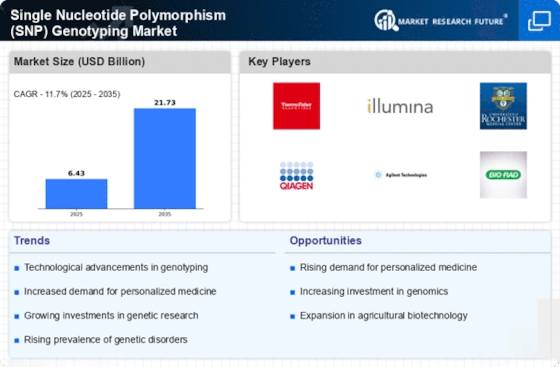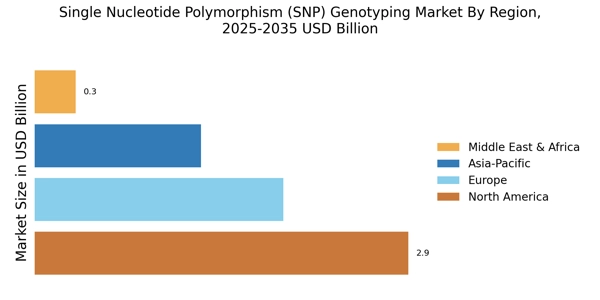Rising Demand for Genetic Testing
The increasing demand for genetic testing is a primary driver of the Single Nucleotide Polymorphism (SNP) Genotyping Market. As healthcare systems evolve, there is a growing emphasis on preventive medicine and personalized treatment plans. Genetic testing allows for the identification of genetic predispositions to various diseases, which can lead to early interventions. According to recent data, the genetic testing market is projected to reach USD 20 billion by 2026, indicating a robust growth trajectory. This surge in demand is likely to propel the SNP genotyping market, as SNPs play a crucial role in understanding genetic variations that influence health outcomes. Consequently, the integration of SNP genotyping into routine clinical practice appears to be an emerging trend, further driving market growth.
Increased Focus on Pharmacogenomics
The growing interest in pharmacogenomics is a significant driver for the Single Nucleotide Polymorphism (SNP) Genotyping Market. Pharmacogenomics studies how genes affect a person's response to drugs, which is crucial for developing personalized medication strategies. As healthcare providers aim to optimize drug efficacy and minimize adverse effects, SNP genotyping becomes essential in identifying genetic variations that influence drug metabolism. The pharmacogenomics market is projected to reach USD 10 billion by 2025, indicating a strong potential for SNP genotyping applications in this field. This focus on tailored therapies is likely to enhance the relevance of SNP genotyping in clinical settings, thereby driving market growth.
Regulatory Support for Genetic Testing
Regulatory support for genetic testing is emerging as a crucial driver for the Single Nucleotide Polymorphism (SNP) Genotyping Market. Governments and regulatory bodies are increasingly recognizing the importance of genetic testing in clinical practice. Initiatives aimed at establishing guidelines and standards for genetic testing are being implemented, which may enhance the credibility and acceptance of SNP genotyping. For example, the FDA has been actively involved in approving genetic tests, thereby facilitating their integration into healthcare systems. This regulatory backing is likely to encourage healthcare providers to adopt SNP genotyping as a standard practice, thereby driving market growth. As regulations evolve, the SNP genotyping market may experience increased stability and growth opportunities.
Advancements in Genotyping Technologies
Technological advancements in genotyping methods are significantly influencing the Single Nucleotide Polymorphism (SNP) Genotyping Market. Innovations such as next-generation sequencing (NGS) and high-throughput genotyping platforms have enhanced the efficiency and accuracy of SNP detection. These technologies enable researchers and clinicians to analyze vast amounts of genetic data rapidly, facilitating large-scale studies and personalized medicine applications. The market for NGS alone is expected to grow at a compound annual growth rate of over 20% in the coming years. As these technologies become more accessible and cost-effective, they are likely to drive the adoption of SNP genotyping, thereby expanding the market further.
Growing Investments in Genomic Research
The increasing investments in genomic research are propelling the Single Nucleotide Polymorphism (SNP) Genotyping Market. Governments and private organizations are allocating substantial funds to genomic studies, recognizing the potential of genomics in advancing healthcare. For instance, initiatives aimed at mapping human genomes and understanding genetic diseases are gaining momentum. The Single Nucleotide Polymorphism (SNP) Genotyping is expected to exceed USD 60 billion by 2025, reflecting a robust interest in genetic research. This influx of funding is likely to enhance the development of SNP genotyping technologies and applications, thereby fostering market expansion. As research progresses, the demand for SNP genotyping services is expected to rise, further solidifying its market position.


















